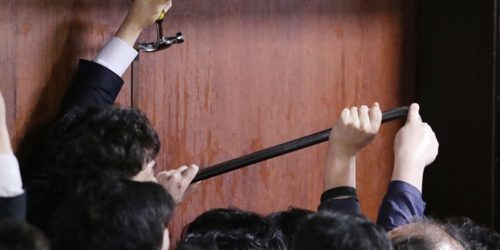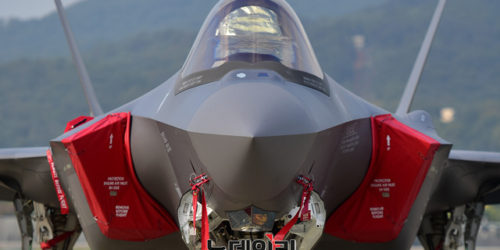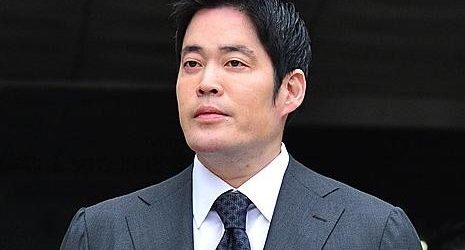Man Sets Himself on Fire to Protest the Passing of Gongsoocheo Act, Interlocked Proportional Representatives System in South Korea
2019-12-30, Tara O
The ruling Deobureo Minjoo Party (Democratic Party of Korea) and 4 smallers parties have been acting as a voting bloc in passing numerous bills that are dangerous to South Korea’s system of liberal democracy. The so-called 1+4 voting bloc almost reflects a single party system, as it excludes the main opposition party in discussions, introductions, and passing of various bills that are designed to extend the rule of the 1+4 for decades to come.
As written earlier here in describing the Gongsoocheo and the Interlocked Proportional Representatives System and their dangers, the smaller parties are:
- Justice Party (split from the now-banned Unified Progressive Party or UPP; The KCTU labor union is its political base)
- Democratic Peace Party/Minjoo Peace (which split from the People’s Party)
- New Alternative Party (대안신당, created a month ago on November 28, 2019 by those who split from Democratic Peace Party)
- Bareun Mirae Party (one part split from the People’s Party, and another part split from the former conservative Saenuri Party, which is now the Liberty Korea Party, after voting to impeach Park Geun-hye)
The Bareun Mirae Party had been split internally about these issues, and the composition–half from the People’s Party and the other half from former Saenuri Party–of the members from different ideological background probably explains it. The other smaller parties have consistently held very similar views and pursued similar policies as the ruling Deobureo Minjoo Party. The views of these groups on North Korea and national security tend to favor North Korea’s position while their domestic policies orient toward socialism/communism of favoring government ownership of land, schools, and housing vice private ownership, and drastically enlarging the share of the population’s reliance on government distribution.
These priorities are reflected in the Super Budget of ₩512.3 trillion ($432 billion) the 1+4 snuck through the National Assembly, while excluding the main opposition Liberty Korea party on December 10, 2019.
By the same method, on December 27, 2019, the 1+4 passed the controversial Interlocked Proportional Representatives System (as part of “election reform), which dramatically increases the number of unelected lawmakers or “proportional representatives” (비례대표), rather than elected lawmakers. The proportional representatives are not answerable to the people, but to the party leaders who appoint them. Also, the party leader can select those who the people would not vote for or those who the people oppose. It goes against the concept of a republic, in which the people exercise their sovereignty through their representatives whom they select. There was no public debate and the concept is obscure to public. The Justice Party has only six lawmakers (including proportional representatives), but it was the main driver behind this system. Sim Sang-jung (심상정), the party leader, could not even explain how the formula for calculating how many proportional representatives will be selected–she just knows that it will be a multi-fold increase of representatives for her party. She told the public they did not need to know. 72% of the citizens opposed the Interlocked Proportional Representatives system.
As part of the “election reform,” the voting age was also reduced from 19 to 18, giving some high school students voting rights. The potential election interference problems arising from Jeongyojo (Korean Teachers and Education Workers’ Union) teachers’ coercion of students is highlighted here.
On December 30, 2019, the 1+4 rammed through the Gongsoocheo Act, passing it by 160 votes for, 14 against, and 3 abstaining (there are a total of 300 seats at the National Assembly). Protesters and the excluded opposition parties have described Gongsoocheo as North Korea’s Ministry of State Security and Nazi Germany’s Gestapo. Gongsoocheo is designed to monitor and investigate senior officials, but it will be placed under the president. The president appoints the chair and many of the other members, and there is nothing else that will check Gongsoocheo or the president. This system could be a powerful tool for the president to use against his political opponents and to control the judges, prosecutors, and the police chiefs. The examples of the Blue House’s tendency to control include:
- Punishing Judge Sung Chang-ho (성창호), who jailed Kim Kyoung-su (김경수), president Moon Jae-in’s close associate and the governor of South Gyeongsang Province, for Kim’s involvement in massive online opinion rigging leading up to the 2017 presidential election. And
- Using the police in South Gyeongsang Province and Ulsan Metropolitan City to target opposition mayoral candidates for investigation just prior to local elections in order to control the outcome of the vote.
A man in his 60s was so disturbed that Gongsoocheo passed that he set himself on fire upon hearing the news. He is in critical condition.
Cho Kuk could not hide his joy at the news that the Gongsoocheo Act passed. Cho Kuk, who Moon Jae-in appointed despite heavy opposition but stepped down after a month, is mired in scandal–treason, corruption, bribery, hypocrisy, daughter’s and son’s college admittance on falsified information–and is under criminal investigation. Cho posted on his Facebook that he had long pushed for Gongsoocheo and “Tears swell because the irreversible institutionalization of prosecution reform is occurring step by step. I can be happy today.”
Many suspect Gongsoocheo will be used to halt the prosecutors from investigating Cho Kuk’s case further, once Gongsoocheo goes into effect, and to shield Cho and other Moon Administration officials from prosecution. Cho may be happy thinking the same.





